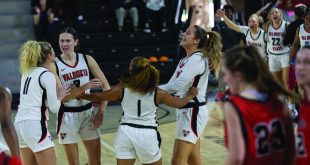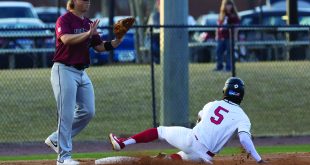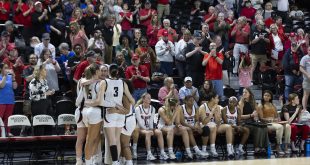PRO- Written by: Austin Wells
Paying student-athletes is difficult to argue, but we must hear the different opinions.
However, money talks and when you look at the revenue that schools make from athletics, it’s hard to say that the student-athletes competing and helping to bring that money in shouldn’t be a part of that revenue.
According to Forbes, the University of Alabama made $143.3 million in athletic revenues in 2013. That’s more money than all 30 National Hockey League teams made and 25 of the 30 National Basketball Association teams made. Yet, the athletes competing for those teams are actually paid for their services while student-athletes receive no part of the millions their school makes off of their play and the merchandise of the team they’re playing for.
Also, when the National Collegiate Athletic Association was first founded in 1905, the argument against paying the student-athletes was that the coaches were not paid either. Today coaches are paid thousands, some of them millions just to coach. What about the young students, who go out and make huge commitments to playing a sport at their college? Don’t they deserve some sort of reward for their services as well?
According to Forbes, the typical college football player puts in more than 43 hours of work a week (the typical American work week is 40 hours). This can be a huge strain on the players, especially considering they have to put in hours of work for their classes as well.
In some cases, student-athletes will even miss classes in order to play a sport for their college. For example, the annual NCAA men’s basketball tournament (known by many as “March Madness”) affects more than six days of classes.
As a student myself, missing one day can put me behind. For a student-athlete having to commit so much of their time to both a sport and an education, having that education affected by their sport must be quite the burden.
It’s a full commitment when a student decides to play a sport for their school. If student-athletes didn’t make that commitment, those millions of dollars that their schools made from just athletics wouldn’t be possible. To say that student-athletes should be paid like professional players is a stretch, but to say they don’t deserve anything for the time and effort they put in for the sport they play is a stretch in itself.
It’s time for the NCAA to change their ways—it’s time to start paying student-athletes.
CON-This story was written by Shane Thomas.
“Show me the money” belongs in the movies, not on the field.
On the surface, paying players sounds logical. After all, the NCAA and its institutions generate much of their revenue from athletic programs and subsequently, the athletes’ talents on the playing field.
However, the term is student-athlete for a reason; individuals attending college are students first, athletes second. The concept of the student-athlete has been diminished due to lucrative television contracts and advertising for college football regular season, bowl games and the Final Four in college basketball. “Student-athlete” has become an umbrella term, different from its intended purpose.
If college athletes are paid, they are no longer students, at least in a traditional sense; they become employees. As an employee, they would be subject to the same regulations as faculty. The balance of power would change drastically as the instructors are paid to educate the students while the student-athletes would be paid to do what exactly?
Given the amount of revenue generated by power schools such as the University of Alabama, paying players would essentially make schools like Alabama the equivalent of the New York Yankees in Major League Baseball. The Yankees are notorious for acquiring the best players and having a bigger payroll than anyone else.
We are talking about educational institutions here, not professional sports teams. Players transfer all the time. What happens if a player wants to leave the school? Does it work like the NBA, where a team trading a player is still responsible for his salary for the duration of his contract? Would a university have to negotiate a buy out of a player and have the player pay the difference? Paying players only causes more problems that do not have easy solutions.
Not everyone gets an opportunity to play college football or college basketball and those who do are not guaranteed to play in the NFL or the NBA. The reality that many ignore is that the institution is not there solely for athletics. There are people swimming in debt chasing their degrees that will never play a second in any collegiate sport. Those people are whom the university should be designed to help, not just athletes.
Colleges and universities are in place for furthering education to prepare individuals to go out into the world as professionals in a variety of fields. Athletics is only a small piece of the puzzle so why should the educational system potentially suffer because of it?
If the NCAA decides to compensate players for benefitting from their play on the field, do so when they are no longer amateurs. Pay former players in the form of pensions. Both the NCAA and former players benefit and the educational system is no longer held hostage.
 The Spectator The independent student newspaper of Valdosta State University
The Spectator The independent student newspaper of Valdosta State University







